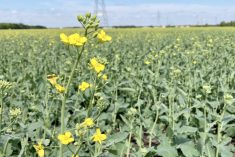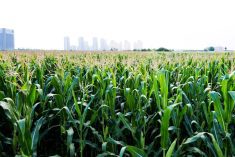CNS Canada — Wheat midge hasn’t been causing as many problems as first anticipated in Western Canada this year, as a dry spring hindered the pests’ emergence.
The Saskatchewan Ministry of Agriculture’s wheat midge forecast, released earlier this year, initially showed high risk levels for the insect, but the dryness is hampering their effects on crops.
“Dr. Bob Elliott’s work at Agriculture and Agri-Food Canada has shown that if you don’t get 25 mm of precipitation prior to the end of May, it will affect wheat midge emergence,” provincial insect specialist Scott Hartley said.
Read Also

Alberta crop conditions improve: report
Varied precipitation and warm temperatures were generally beneficial for crop development across Alberta during the week ended July 8, according to the latest provincial crop report released July 11.
“Although some areas did, like down in southeast Saskatchewan was probably one area that did, there are a number of areas that didn’t — it’s just been that dry.”
Wheat midge populations need moisture by the end of May to trigger them to go into their pupal stage, so the dryness results in later, more erratic emergence.
Crop development in Western Canada this year has also varied widely along with weather conditions, which has lowered the crops’ susceptibly to midge damage.
“There’s either some that might have grown out of the stage before midge emerged, others that went through that stage fairly quickly, and other ones probably weren’t even into the susceptible stage by the time midge were emerging,” Hartley said.
As of last Saturday (July 12), wheat midge populations were about 50 to 90 per cent emerged in most of Western Canada, according to a weekly report from the Prairie Pest Monitoring Network.
Even in the regions that got moisture in late May, such as Manitoba and southeastern Saskatchewan, significant damage from the insect hasn’t been reported, according to weekly provincial crop updates.
We’re now coming to the end of wheat midge season, Alberta’s provincial insect management specialist Scott Meers said in a weekly insect update on Thursday, so the chance of the problem getting worse in coming weeks is diminishing.
— Terryn Shiells writes for Commodity News Service Canada, a Winnipeg company specializing in grain and commodity market reporting.














